James Mason is a Actor, Scriptwriter, Producer and Additional Writing British born on 15 may 1909 at Huddersfield (United-kingdom)

James Neville Mason (15 May 1909 – 27 July 1984) was an English actor.
After achieving much success in the United Kingdom (he was the top box office attraction there in 1944 and 1945), he made the transition to the United States and became one of the biggest stars in Hollywood, starring in iconic films including The Desert Fox, A Star Is Born, 20,000 Leagues Under the Sea, Lolita, North by Northwest, Journey to the Centre of the Earth, Bigger Than Life, Julius Caesar, Georgy Girl, The Deadly Affair, The Boys from Brazil, The Verdict, Mandingo, Murder by Decree and Salem's Lot.
He was nominated for three Academy Awards and three Golden Globes (winning the Golden Globe in 1955 for A Star is Born).
Mason was born in Huddersfield, in the West Riding of Yorkshire, to Mabel Hattersley (Gaunt) and John Mason. His father was a wealthy textile merchant. He was educated at Marlborough College, and earned a first in architecture at Peterhouse, Cambridge where he became involved in stock theatre companies in his spare time. Mason had no formal training as an actor and initially embarked upon it for fun. After Cambridge he made his stage debut in Aldershot in The Rascal in 1931. He joined The Old Vic theatre in London under the guidance of Tyrone Guthrie. In 1933 Alexander Korda gave Mason a small role in The Private Life of Don Juan but sacked him three days into shooting.
Career
From 1935-38, he starred in many British quota quickies. He registered as a conscientious objector during the Second World War (causing his family to break with him for many years), but his tribunal exempted him only on the requirement to do non-combatant military service, which he refused; his appeal against this became irrelevant by including him in a general exemption for film work.
Mason became hugely popular for his brooding anti-heroes in the Gainsborough series of melodramas of the 1940s, including The Man in Grey (1943) and The Wicked Lady (1945). He also starred with Deborah Kerr and Robert Newton in Hatter's Castle (1942). He then took the lead role in the popular The Seventh Veil (1945), which set box office records in post-war Britain and raised him to international stardom. He followed it with a role as a mortally wounded IRA bank robber on the run in Odd Man Out (1947) and his first Hollywood film, Caught (1949). Exhibitors voted him the most popular star in Britain in each year between 1944 and 1947. They also thought he was the most popular international star in 1946; he dropped to second place the following year. He was the most popular male star in Canada in 1948.
Mason's "languid but impassioned" vocal talent enabled him to play a menacing villain as easily as his good looks assisted him as a leading man. His roles include Brutus in Julius Caesar (1953), Field Marshal Erwin Rommel in The Desert Fox: The Story of Rommel and The Desert Rats, the amoral valet turned spy in Joseph L. Mankiewicz's 5 Fingers, the declining actor in the first remake of A Star Is Born (1954), Captain Nemo in 20,000 Leagues Under the Sea (also 1954), a small town school teacher driven insane by the effects of cortisone in Bigger Than Life (1956), a suave master spy in North by Northwest (1959) and a determined explorer in Journey to the Centre of the Earth (also 1959).
In the 1950s, Mason was host of Lux Video Theatre on CBS television.
In 1963 he settled in Switzerland, and embarked on a transatlantic career. He played Humbert Humbert in Stanley Kubrick's version of Lolita (1962), a river pirate who betrays Peter O'Toole's character in Lord Jim (1965), Bradley Morahan in Norman Lindsay's Age of Consent (1969), the evil Doctor Polidori in Frankenstein: The True Story (1973), the vampire's servant, Richard Straker, in Salem's Lot, and surreal Royal Navy Captain Hughes in Yellowbeard (1983). One of his last roles, that of corrupt lawyer Ed Concannon in The Verdict (1982), earned him his third and final Oscar nomination.
Late in his life, Mason narrated two British documentary series supervised by Kevin Brownlow: Hollywood (1980), on the silent cinema and Unknown Chaplin (1983), devoted to out-take material from the films of Charlie Chaplin. Mason had been a long-time neighbour and friend of the comedian.
Having completed playing the lead role in Dr. Fischer of Geneva (1985), adapted from the Graham Greene's eponymous novella for the BBC, he stepped into the role originally meant for Paul Scofield in The Shooting Party, who was unable to continue after being seriously injured in an accident on the first day of shooting. This was to be Mason's final screen performance.
In the late 1970s, Mason became a mentor to up-and-coming actor Sam Neill.
Source : Wikidata
James Mason

Birth name James Neville Mason
Nationality United-kingdom
Birth 15 may 1909 at Huddersfield (United-kingdom)
Death 27 july 1984 (at 75 years) at Lausanne (Suisse)
Nationality United-kingdom
Birth 15 may 1909 at Huddersfield (United-kingdom)
Death 27 july 1984 (at 75 years) at Lausanne (Suisse)
James Neville Mason (15 May 1909 – 27 July 1984) was an English actor.
After achieving much success in the United Kingdom (he was the top box office attraction there in 1944 and 1945), he made the transition to the United States and became one of the biggest stars in Hollywood, starring in iconic films including The Desert Fox, A Star Is Born, 20,000 Leagues Under the Sea, Lolita, North by Northwest, Journey to the Centre of the Earth, Bigger Than Life, Julius Caesar, Georgy Girl, The Deadly Affair, The Boys from Brazil, The Verdict, Mandingo, Murder by Decree and Salem's Lot.
He was nominated for three Academy Awards and three Golden Globes (winning the Golden Globe in 1955 for A Star is Born).
Biography
Early lifeMason was born in Huddersfield, in the West Riding of Yorkshire, to Mabel Hattersley (Gaunt) and John Mason. His father was a wealthy textile merchant. He was educated at Marlborough College, and earned a first in architecture at Peterhouse, Cambridge where he became involved in stock theatre companies in his spare time. Mason had no formal training as an actor and initially embarked upon it for fun. After Cambridge he made his stage debut in Aldershot in The Rascal in 1931. He joined The Old Vic theatre in London under the guidance of Tyrone Guthrie. In 1933 Alexander Korda gave Mason a small role in The Private Life of Don Juan but sacked him three days into shooting.
Career
From 1935-38, he starred in many British quota quickies. He registered as a conscientious objector during the Second World War (causing his family to break with him for many years), but his tribunal exempted him only on the requirement to do non-combatant military service, which he refused; his appeal against this became irrelevant by including him in a general exemption for film work.
Mason became hugely popular for his brooding anti-heroes in the Gainsborough series of melodramas of the 1940s, including The Man in Grey (1943) and The Wicked Lady (1945). He also starred with Deborah Kerr and Robert Newton in Hatter's Castle (1942). He then took the lead role in the popular The Seventh Veil (1945), which set box office records in post-war Britain and raised him to international stardom. He followed it with a role as a mortally wounded IRA bank robber on the run in Odd Man Out (1947) and his first Hollywood film, Caught (1949). Exhibitors voted him the most popular star in Britain in each year between 1944 and 1947. They also thought he was the most popular international star in 1946; he dropped to second place the following year. He was the most popular male star in Canada in 1948.
Mason's "languid but impassioned" vocal talent enabled him to play a menacing villain as easily as his good looks assisted him as a leading man. His roles include Brutus in Julius Caesar (1953), Field Marshal Erwin Rommel in The Desert Fox: The Story of Rommel and The Desert Rats, the amoral valet turned spy in Joseph L. Mankiewicz's 5 Fingers, the declining actor in the first remake of A Star Is Born (1954), Captain Nemo in 20,000 Leagues Under the Sea (also 1954), a small town school teacher driven insane by the effects of cortisone in Bigger Than Life (1956), a suave master spy in North by Northwest (1959) and a determined explorer in Journey to the Centre of the Earth (also 1959).
In the 1950s, Mason was host of Lux Video Theatre on CBS television.
In 1963 he settled in Switzerland, and embarked on a transatlantic career. He played Humbert Humbert in Stanley Kubrick's version of Lolita (1962), a river pirate who betrays Peter O'Toole's character in Lord Jim (1965), Bradley Morahan in Norman Lindsay's Age of Consent (1969), the evil Doctor Polidori in Frankenstein: The True Story (1973), the vampire's servant, Richard Straker, in Salem's Lot, and surreal Royal Navy Captain Hughes in Yellowbeard (1983). One of his last roles, that of corrupt lawyer Ed Concannon in The Verdict (1982), earned him his third and final Oscar nomination.
Late in his life, Mason narrated two British documentary series supervised by Kevin Brownlow: Hollywood (1980), on the silent cinema and Unknown Chaplin (1983), devoted to out-take material from the films of Charlie Chaplin. Mason had been a long-time neighbour and friend of the comedian.
Having completed playing the lead role in Dr. Fischer of Geneva (1985), adapted from the Graham Greene's eponymous novella for the BBC, he stepped into the role originally meant for Paul Scofield in The Shooting Party, who was unable to continue after being seriously injured in an accident on the first day of shooting. This was to be Mason's final screen performance.
In the late 1970s, Mason became a mentor to up-and-coming actor Sam Neill.
Best films
Usually with
Filmography of James Mason (124 films)
Actor
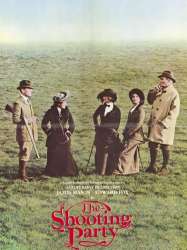
The Shooting Party (1985)
, 1h38Directed by Alan Bridges
Origin United-kingdom
Genres Drama, Historical, Romance
Actors James Mason, Edward Fox, Dorothy Tutin, John Gielgud, Gordon Jackson, Robert Hardy
Roles Sir Randolph Nettleby
Rating67%





Octobre 1913. Au cœur de la campagne anglaise, Sir Randolph convie quelques amis dans sa propriété pour une partie de chasse réglée selon l'étiquette. L'action se passe en 1913 et fait voir le mode de vie d'aristocrates anglais rassemblés pour une chasse au faisan, par opposition avec celui des paysans du lieu venus pour servir de rabatteurs au service du plaisir des maîtres. Sûrs d'eux-mêmes et vivant dans l'opulence, ils voient se briser l'équilibre de la fête avec la mort accidentelle de l'un des chasseurs et la multiplication de troubles sociaux…

A.D. (miniseries) (1985)
, 5hDirected by Stuart Cooper
Genres Drama, Historical
Actors Anthony Andrews, Colleen Dewhurst, Ava Gardner, David Hedison, John Houseman, Richard Kiley
Roles Tiberius
Rating71%





The story tells the life histories about Saint Peter and Paul of Tarsus after the crucifixion of Jesus, and their individual fates in old Rome in the time of the persecution of Christians. Events in the New Testament Book of Acts by Luke and in the Ecclesiastical History of Eusebius are dramatized and interwoven with the contrasting histories of political intrigues in the public and private lives of the Caesars from Tiberius through Nero related in The Twelve Caesars by Suetonius, together with the fictional drama of the lives of two Jews and two Romans: Caleb the Zealot and his sister Sarah, and Julius Valerius the Imperial Guard and Corinna the patrician woman who has chosen to be a gladiator.
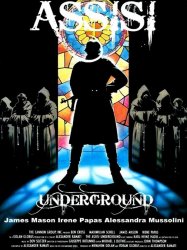
The Assisi Underground (1985)
, 2h55Origin United-kingdom
Genres Drama, War, Historical, Crime
Themes Films about religion, Political films, Films about Jews and Judaism
Actors Ben Cross, James Mason, Irène Papas, Maximilian Schell, Maurice Poli, Geoffrey Copleston
Roles Bishop Nicolini
Rating60%





In 1943 Franciscan priest Rufino Niccacci is charged by the bishop of Assisi Giuseppe Placido Nicolini with rescuing Italian Jews from the Nazis.
 , 8h
, 8hDirected by Buzz Kulik
Origin USA
Genres Biography, Historical
Themes Political films
Actors Barry Bostwick, Patty Duke, David Dukes, Jaclyn Smith, Lloyd Bridges, José Ferrer
Roles General Braddock
Rating77%





This miniseries covers the life of George Washington, from the time he is a young man, through his experiences in the French and Indian War and his rise to lead the Continental Army during the American Revolution. It concludes shortly after the end of the war, with Washington's return to his home in Mount Vernon.
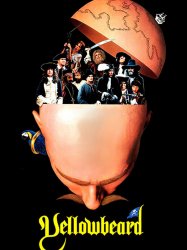
Yellowbeard (1983)
, 1h36Directed by Mel Damski
Origin United-kingdom
Genres Comedy, Action, Adventure
Themes Seafaring films, Transport films, Pirate films
Actors Graham Chapman, Peter Boyle, Tommy Chong, Cheech Marin, Peter Cook, Marty Feldman
Roles Captain Hughes
Rating58%





The pirate Yellowbeard (Chapman) is incarcerated for 20 years for tax evasion. He survives the sentence but has not disclosed the whereabouts of his vast treasure. The Royal Navy hatches a plot to increase his sentence by 140 years, knowing that he will escape to set out for his treasure. He does so, recruiting a motley crew of companions. He had left a map of the treasure in the chimney of his wife's pub, but she burned it. She then tells Yellowbeard that she had the map tattooed on their son's head. Things go wrong when his traitorous former bosun Mr. Moon (Boyle) takes over the ship. With the Head of the British Secret Service (Idle) hot on their trail, they eventually find the island, where the terrible despot "El Nebuloso" and his majordomo "El Segundo" (Cheech and Chong) have taken residence with the treasure, and the battle for the prize commences.
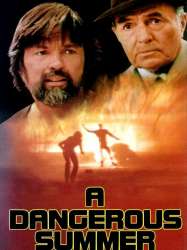
A Dangerous Summer (1982)
, 1h28Genres Drama, Thriller, Crime
Themes Disaster films
Actors Tom Skerritt, James Mason, Shane Porteous, Ray Barrett, Guy Doleman, Wendy Hughes
Roles George Engels
Rating35%





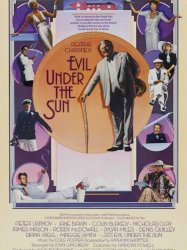
Evil Under the Sun (1982)
, 1h52Directed by Guy Hamilton
Origin United-kingdom
Genres Drama, Thriller, Crime
Themes Seafaring films, Transport films
Actors Peter Ustinov, James Mason, Maggie Smith, Nicholas Clay, Jane Birkin, Colin Blakely
Roles Odell Gardener
Rating69%





A hiker finds a dead woman on the Yorkshire moors; the victim, who has been strangled, is identified as Alice Ruber. Shortly afterwards, Belgian detective Hercule Poirot (Peter Ustinov) examines a diamond belonging to millionaire industrialist Sir Horace Blatt (Colin Blakely), and declares it a fake. Assured that Sir Horace gave a real diamond to his mistress and she later returned the fake to him, Poirot accompanies Sir Horace to confront her at an exclusive island resort. The hotel is the former summer palace of the reigning King of Tyrania, now owned by Daphne Castle (Maggie Smith), who had received the palace "for services rendered".

The Verdict (1982)
, 2h9Directed by Sidney Lumet
Origin USA
Genres Drama
Themes Films about alcoholism, Medical-themed films, Films about drugs, Children's films
Actors Paul Newman, Charlotte Rampling, Jack Warden, James Mason, Milo O'Shea, Lindsay Crouse
Roles Ed Concannon
Rating76%





Frank Galvin (Paul Newman) was once a promising graduate of Boston College Law School and a lawyer at an elite Boston law firm. But he was framed for jury tampering some years back by the firm's senior partner because he was going to expose their corrupt practices. Although he retains his license to practice law, Frank has become an alcoholic ambulance chaser who has had only four cases over the last three years, all of which he has lost.

Ivanhoe (1982)
, 2h22Directed by Douglas Camfield
Genres Drama, Action, Adventure, Historical
Actors Anthony Andrews, James Mason, Sam Neill, Michael Hordern, Olivia Hussey, Lysette Anthony
Roles Isaac of York
Rating66%





Ivanhoe (Anthony Andrews), un jeune chevalier saxon dévoué à sa foi chrétienne, revient en Angleterre après avoir combattu lors des Croisades pour découvrir qu'il a été déshérité par son père sévère et bigote, que sa douce enfance a été fiancée à un autre homme et que le pays est en pleine révolte.

North Sea Hijack (1980)
, 1h35Directed by Andrew V. McLaglen, Brian W. Cook
Origin United-kingdom
Genres Thriller, Action, Adventure
Themes Seafaring films, Films about terrorism, Transport films
Actors Roger Moore, James Mason, Anthony Perkins, Michael Parks, Jack Watson, George Baker
Roles Admiral Brindsen
Rating62%





Misogynist freelance marine counter-terrorism consultant Rufus Excalibur ffolkes (Roger Moore) is asked by Lloyd's of London to develop a contingency plan should any of the North Sea oil installations they insure be threatened.

Hollywood (1980)
Directed by Kevin Brownlow
Origin United-kingdom
Genres Documentary
Themes Documentary films about business, Documentary films about the film industry, Documentary films about cities
Actors James Mason
Roles Himself (voice)
Rating92%





The series consists of thirteen fifty-minute episodes, with each episode dealing with a specific aspect of Hollywood history. The actor James Mason, an enthusiast of the period, supplied the narration; a lilting score was contributed by Carl Davis.

Murder by Decree (1979)
, 2h4Directed by Bob Clark
Origin United-kingdom
Genres Drama, Thriller, Crime
Themes Sherlock Holmes films, Buddy films
Actors Christopher Plummer, James Mason, David Hemmings, Susan Clark, Frank Finlay, Geneviève Bujold
Roles Dr. John H. Watson
Rating67%





Sherlock Holmes et le docteur Watson sont sur la piste de Jack l'Éventreur. Leur enquête va les mener dans l'entourage de la famille royale, du gouvernement britannique et de la franc-maçonnerie.

Bloodline (1979)
, 1h52Directed by Terence Young
Origin German
Genres Thriller, Crime
Actors Audrey Hepburn, Ben Gazzara, James Mason, Irène Papas, Claudia Mori, Michelle Phillips
Roles Sir Alec Nichols
Rating46%





Sam Roffe, President of Roffe & Sons Pharmaceuticals, dies in what appears to be a climbing accident, leaving his daughter Elizabeth (Audrey Hepburn) a billion-dollar empire. Roffe's board members see an opportunity to settle old scores, jockey for higher position, and reap lucrative profits. However, an investigation into Sam's death discloses that it was a murder and that a power struggle is going on within the company.
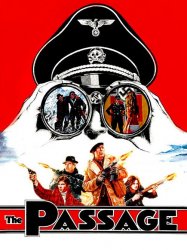
The Passage (1979)
, 1h39Directed by J. Lee Thompson
Origin United-kingdom
Genres Drama, War, Thriller, Action
Themes Sports films, Political films
Actors Anthony Quinn, James Mason, Malcolm McDowell, Patricia Neal, Christopher Lee, Kay Lenz
Roles Professor Bergson
Rating60%





During World War II, a Basque farmer (Anthony Quinn) is asked by the French resistance to help a fleeing scientist (James Mason) and his family escape across the Pyrenees Mountains to safety in neutral Spain. On his trail are a group of Germans, led by a sadistic SS officer (Malcolm McDowell).
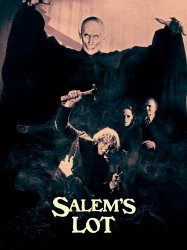 , 3h4
, 3h4Directed by Tobe Hooper
Origin USA
Genres Drama, Thriller, Horror
Themes Films about magic and magicians, Vampires in film
Actors David Soul, James Mason, Lance Kerwin, Bonnie Bedelia, Lew Ayres, Julie Cobb
Roles Richard K. Straker
Rating67%





The prologue shows a church in Guatemala in which a man and a boy, Ben Mears and Mark Petrie, are filling small bottles with holy water. When one of the bottles begins to emit an eerie supernatural glow, Mears tells Petrie "They've found us again." Knowing an evil presence is there, they decide to fight it.
 Connection
Connection






